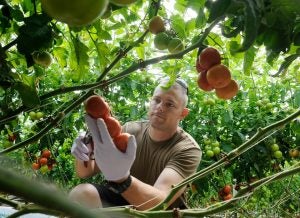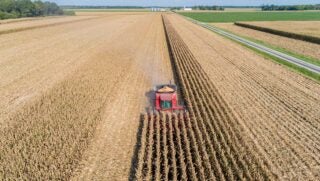Military service does not have much gray area — jobs are done step-by-step and expectations are laid out clearly in black and white. The structure that is inherent in the military lifestyle makes it easier. And aside from a primary job, servicemembers often have other responsibilities or roles within their unit so they end up with many other responsibilities. All of this keeps the boat afloat, so to speak. It also gives servicemembers experience playing different roles in a single organization.
Which is good because farmers and ranchers also have to wear a lot of hats. They have to be professionals in science, accounting, marketing, and so many other things. Getting a farming operation up and running requires discipline, organization and straight-up determination. Maybe that’s why farming seems to be a tailor-made next step for military veterans.
In training, servicemembers learn to rely on each other in order to survive in battle or get a job done. According to Jeanette Lombardo, Executive Director of Farmer Veteran Coalition, the separation from military service is the most difficult part. “They’re dropped in this place where nobody can really relate to their experience,” she said. And they often get dropped there with trauma.
» Related: Healing on horseback: New Freedom Farm gives veterans with PTSD a new path
When asked what it is about veterans that makes them successful in agriculture, Lombardo said, “I think it’s really just grit. When you’re in the military, you just work until the job’s done … and if you get stuck, you find another way to work around it. And that is very important in farming.”
If a veteran is interested in farming, there are a wide variety of resources available to them. Many of those resources are low- or no-cost and easily accessed once the veteran has the information. Farmer Veteran Coalition (FVC) provides training, financial, business and farming resources. If a veteran is just starting out and reaches out to FVC, they can expect to be connected with a professional who will help them go over their benefits and discuss their goals in the agricultural space. This will start a conversation that will allow them to gather the information they need to draft a business plan.
This course of action is exactly the type of structured, step-by-step plan that veterans are accustomed to and makes the transition very approachable for the new veteran farmer. Lombardo suggests that the veteran lease the land, at least in the beginning, in order to save money for other equipment or items necessary to begin their operation. It’s a journey — don’t go all in at once.
“Money shouldn’t be a reason why you don’t farm, because there’s a lot of resources out there to help get you where you need to be,” Lombardo said.

If there were one piece of advice that Lombardo would give prospective veteran farmers it’s this: “Always know that you can ask for help … because when you make mistakes in farming, it’s big dollars. … You don’t want to learn that way. It’s better to learn from someone else’s mistakes.”
As veterans navigate the transition to civilian life, it’s important for them to find their people again. Programs such as those offered by FVC can help. Aside from the national program, there are many active state chapters. There are also many grassroots organizations dedicated to helping veterans make careers in ag. Vets on the Farm and Growing Veterans based out of Washington state are good examples. F.A.R.M. (Farmers Assisting Returning Veterans) is based out of Texas, and who doesn’t love a clever acronym? Pennsylvania Veteran Farming Network – Troops to Tractors is based in the Northeast. And there are many, many more. The point is, veterans need to find their people again, and there are plenty of places to look. If these kinds of programs don’t exist where they are, they could consider starting a program themselves.
How can civilians help? Look for the Homegrown by Heroes logo at farmers markets and on websites. That means the product has been confirmed and blessed by FVC as “veteran grown” — the same way consumers make an effort to purchase food grown responsibly, seek out veteran grown produce, protein, and fiber. Support the programs that support veterans.
“[FVC has] 36,000 members, but if you look at the 2017 census from the [National Agricultural Statistics Survey], you’ll see that there’s 370,000 farmers across the United States that have military experience. And they’re farming 129 million acres of land. … You have no idea how impactful veterans are in the rural communities,” Lombardo said.
When military servicemembers lose their military family, what they really need is a connection to their new community. This is especially true for veteran farmers who live rurally.
Farmer- and veteran demographics each have higher suicide rates than the general population, and when you put the two together, it can be recipe for disaster or a recipe for a miracle. A 2022 study published in the American Journal of Industrial Medicine, with information gathered from 40 states, shows that around 60 percent of suicides are in ag, with 22 percent of those being veterans. Living rurally sometimes makes community hard to find, and the financial strain of farming, especially in the past couple of years, can be a difficult obstacle to overcome.
But there’s always hope. Lombardo goes on, “Not only are [veterans] planting and feeding America, but they’re running the schools, volunteering at the fire department, and I just think the veterans lift up rural America. And when there were problems with the food supply during the pandemic and everyone started panicking in the grocery stores, they soon realized that the farmers were at the edges of their towns and they just had to get reconnected with them.”
In the case of the veteran farmer, the transition from military life to civilian life can be the transition of protecting America to feeding it. So if you’re looking for a way to make a difference, get reconnected with them. Seek out veteran farmers and ask what their story is. Purchase food or fiber from their farms. The ag industry depends on it.
Here is a list of resources that is by no means exhaustive:
- Farmer Veteran Coalition Fellowship Fund
- Homegrown by Heroes
- VA Home Loans
- AgrAbility
- SCORE
- Veterans and Entrepreneurship
- AgVets
- Beginning Farmer and Rancher Development Program
Brianna Scott is a veteran farmer who lives in Eastern Washington while earning her Master’s of Science in Agriculture from Washington State University. She is active in the veteran ag community and raises poultry and livestock while growing a large market garden.



